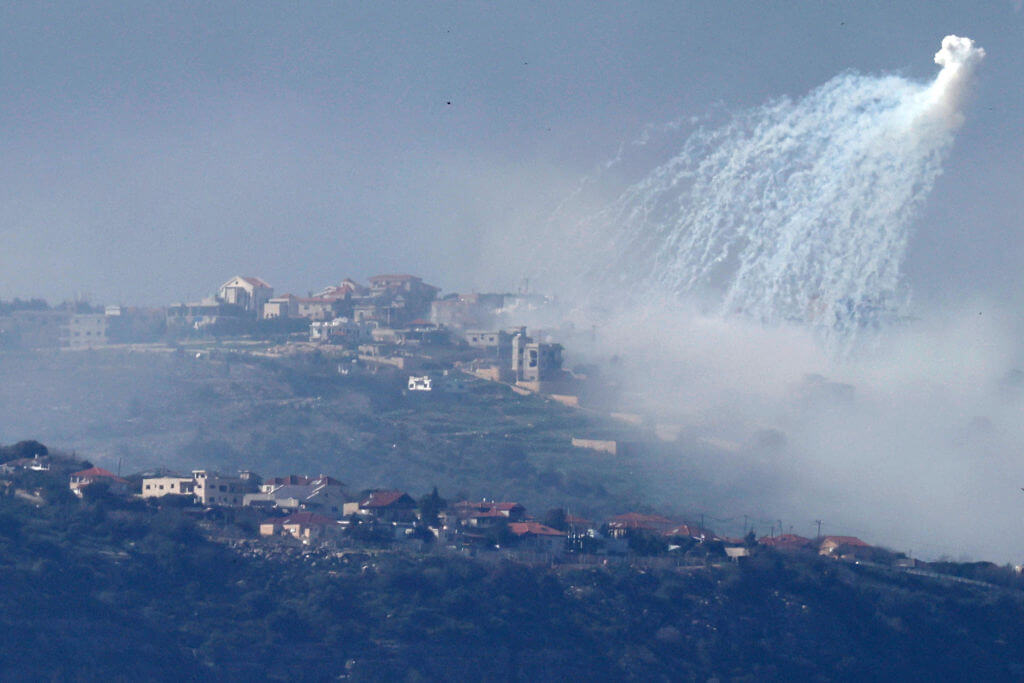Missile strike from Lebanon into Israel kills 1 foreign worker and injures 7 as fears of wider war escalate
After Israeli citizens, Thai workers were the most affected by Hamas’ Oct. 7 invasion of Israel

A picture taken from northern Israel, along the border with southern Lebanon on March 4, 2024, shows smoke billowing following Israeli bombardment on the Lebanese village of Markaba. Photo by Getty Images
TEL AVIV (JTA) — An anti-tank missile fired from Lebanon into Israel on Monday killed one agricultural worker from India and wounded seven, two in serious condition, after landing near the northern Israeli town of Margoliot.
Indian media identified the man who died as Patnibin Maxwell and said he had arrived in Israel just two months ago, leaving behind a pregnant wife and young child.
The fatality was the seventh civilian death in Israel from its fight with the Lebanese terror group Hezbollah, which began attacking Israel shortly after the outbreak of its war with Hamas in Gaza on Oct. 7. Ten Israeli soldiers and hundreds of people in Lebanon, the vast majority of them Hezbollah fighters, have been killed in that conflict.
Fears of a broader war with Hezbollah have risen even as Israel is still fighting Hamas, and on Monday, U.S. envoy Amos Hochstein visited officials in Beirut today to present a plan that would implement a demilitarized zone in southern Lebanon and facilitate the reconstruction of its border region with Israel.
“A temporary cease-fire is not enough. A limited war is not containable and the security paradigm along the Blue Line has to change in order to guarantee everyone’s security,” Hochstein said, according to the Associated Press, using a term for the border between Israel and Lebanon.
According to a recent poll in the Israeli newspaper Maariv, 71% of Israelis support a broader Israeli military response to Hezbollah, whose attacks have led nearly 100,000 Israelis to be evacuated from their homes in the North.
Monday’s attack is also the latest blow to foreign workers in Israel, who make up a significant portion of the agriculture workforce. After Israeli citizens, Thai workers were the most affected by Hamas’ Oct. 7 invasion of Israel, which killed some 1,200 people and kidnapping more than 250. According to the Thai Foreign Ministry, 32 of its citizens were killed on Oct. 7, while dozens others were taken hostage and injured.
In November, 23 Thai hostages were released in a separate deal between Bangkok and Hamas that was mediated by third parties. There remain eight Thai hostages and one Nepali among the estimated 136 hostages still held by Hamas, of whom Israel has said about 100 may remain alive.
Since the outbreak of war, about one third of the 30,000 Thai workers in Israel have left. Thai workers have come to Israel in recent decades because some reportedly earn more than eight times their Thai salary; their exit after Oct. 7 has contributed to a crisis in Israeli agriculture.
An unreported number have returned from Thailand to work near the front lines of Israel’s conflicts in the south and north, drawn by the high wages in spite of the dangerous conditions that led to Israeli citizens evacuating. Workers from other countries, including India, have also arrived to fill the labor gap, which in safer parts of Israel has been mitigated by Israeli volunteers seeking to contribute to the war effort.
According to the Israeli Agricultural Ministry, the area where Monday’s strike occurred is notable for being the main supplier of eggs for the Israeli military.
Editor’s note: This story has been updated.
A message from our Publisher & CEO Rachel Fishman Feddersen

I hope you appreciated this article. Before you go, I’d like to ask you to please support the Forward’s award-winning, nonprofit journalism so that we can be prepared for whatever news 2025 brings.
At a time when other newsrooms are closing or cutting back, the Forward has removed its paywall and invested additional resources to report on the ground from Israel and around the U.S. on the impact of the war, rising antisemitism and polarized discourse.
Readers like you make it all possible. Support our work by becoming a Forward Member and connect with our journalism and your community.
— Rachel Fishman Feddersen, Publisher and CEO

























